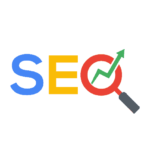You’ve probably heard a million times that Search Engine Optimisation (SEO) is a vital digital marketing tool. But do you really know how it works? Even with a basic understanding of what is involved, you might still struggle to gain a solid grasp on this complex and multifaceted process. SEO optimisation is the practice of getting targeted traffic to a website from a search engine’s organic rankings. In short, common tasks associated with SEO include creating high-quality content, optimising content around specific keywords, and building backlinks. SEO is vital in getting your website seen online, and so it’s important to understand how it works and how you can improve your SEO ranking.
There can be a lot of confusion and misinformation around SEO processes and how to get it right, as well as lots of people and companies promoting “growth hacks” and ways to cheat the system. However, just like most things – including your business, it just takes strategy, energy, and time to improve. Think of SEO as an investment. By investing in SEO, you create long-term value for your website that will continue to accrue over time.
Ready to kickstart your digital marketing strategy with SEO marketing? Contact us today.
Types of SEO optimisation
On-page & technical SEO optimisation
On-page SEO is the practice of optimising everything on your website that you have control over and can change. Common on-page SEO components include optimising title tags, meta descriptions, ALT tags, content, internal links and URLs. By focusing on your on-page SEO, it will also increase the performance of your off-page SEO strategy.
Technical SEO refers to the actions implemented to help search engines crawl your website and enhance user experience (UX). For example, the following technical SEO components should be addressed:
- Website speed – having a faster website speed is beneficial not only for search engines, but also website visitors. Page speed is a direct ranking factor on Google as they want to provide a good user experience. If the website has a slow site speed, they will leave after 3 seconds.
- Mobile friendliness – More than 56% of web traffic comes from mobile devices. Therefore, it is important to check that your website performs well on both desktop and mobile devices.
- Site structure – URLs are fundamental for having an effective site hierarchy, passing equity through your domain and directing users to their desired destinations. It is important to keep URL structures easy to read, simple and contain relevant search queries.
Do you need an SEO check? Contact us for more information.
Off-page SEO optimisation
Off-Page SEO strategies are actions taken away from your website. The biggest off-page SEO component would be backlinking. Simply put, backlinks are links from an external website to a page on your website. They are basically votes from other websites which tells search engines that the content is valuable, credible, and useful. When choosing external websites for backlinking, it is important that you select websites that are relevant to your business and have a good page authority. Through this process, Google transfers some of the external website’s page authority to your website, which increases your ranking Google’s SERP. Other off-page SEO can include social media marketing, guest blogging and brand building.
Read our blog 5 SEO Tips Every Business Should Know to find out more.
Benefits of having an SEO marketing strategy
Search Engine Optimisation builds trust and credibility
A site that ranks high on search engine results pages is generally considered as high-quality and trustworthy by search engines, which in turn, boosts the credibility of your business. There are many elements that go into establishing authority and ranking on search engine results pages like Google. For example, in order for you to rank highly, your website needs to have relevant content. Content should be easy to read, provide all the important details needed and be unique to your website. Additionally, you can boost credibility by increasing your site speed and researching quality keywords that will help your site rank higher.
SEO marketing amplifies PPC campaigns
Unpaid (SEO) and paid marketing strategies (PPC) work extremely well together when properly utilised. PPC helps your site appear at the top of paid search results, while SEO does the same thing organically. If your budget allows you to use both SEO & PPC, you absolutely should, as it will balance short-term and longer-term returns. Additionally, having both results appear at the top of the search engine results page will boost your brand’s credibility and shows that you are not simply throwing money at advertising to be on top.
Stay ahead of competition with an SEO optimised website
Consider two businesses in the same industry that offer identical products or services and sell them at similar pricing. One of them has an SEO website that is optimised for search engines, whereas the other business does not. Given all other factors equal, which business do you think will get more customers? It will be the business that appears on the first page of search engine results!
Get an SEO check today with Marketigation. Contact us to learn more.
Increase user engagement and website usability
A website that is SEO optimised brings in quality traffic. If you have a site with relevant content that matches the searcher’s intent, they will likely spend more time browsing. SEO optimisation is not only about making your website search engine-friendly, but also improving it for the customers overall experience. If you work hard to generate useful and high-quality content, make your site speed faster and more responsive, your visitors will stay on your site for longer. This will ultimately lead to more conversions and increased ROI.
SEO has major benefits for websites and can lead to long-term exponential growth. Businesses that invest in SEO can build credibility and trust with their audiences, making it a fundamental part of their digital marketing strategy. Want to learn more or get started with SEO check? Contact us today.
